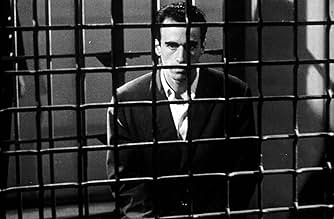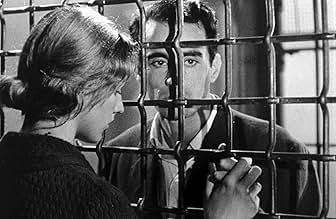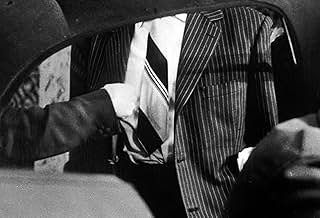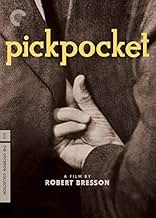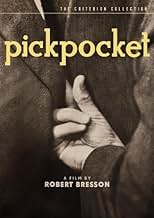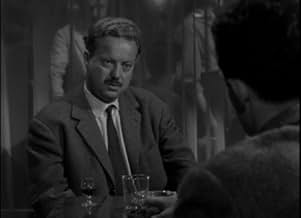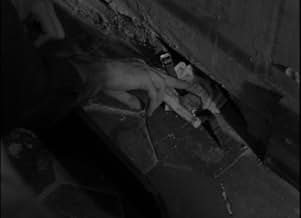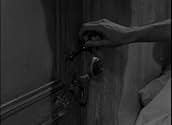IMDb-BEWERTUNG
7,6/10
26.719
IHRE BEWERTUNG
Füge eine Handlung in deiner Sprache hinzuMichel passes the time by picking pockets, careful to never be caught despite being watched by the police. His friend Jacques may suspect, while both men may have their eyes on Jeanne, the p... Alles lesenMichel passes the time by picking pockets, careful to never be caught despite being watched by the police. His friend Jacques may suspect, while both men may have their eyes on Jeanne, the pretty neighbor of Michel's ailing mother.Michel passes the time by picking pockets, careful to never be caught despite being watched by the police. His friend Jacques may suspect, while both men may have their eyes on Jeanne, the pretty neighbor of Michel's ailing mother.
- Auszeichnungen
- 3 Nominierungen insgesamt
Empfohlene Bewertungen
- Do you feel lonely ? -Bresson : very lonely . Very but I don't like it to be lone !!
It would be hard for a regular movie-watcher , some one who just watches for fun , to like the movies made by formalist , strictly stylist director , Robert Bresson . But when we are aware of his elaborate work and subtlety , we admire his skill , undoubtedly .
Pickpocket ( 1959 ) , is one his best and most thoughtful films and has a key role in recognizing both Bresson and his works .
Pickpocket is about an alone and desperate writer who think of himself as a superior to the society ; He thinks he is better than others and believes to be in the right of breaking the rules and neglecting the social Contract .
He defines justice for himself as " some people have the privilege to break the laws , willingly " . He feels humiliated to do regular jobs and thus , begins pocket picking .
And from one of the most basic elements of the story , i.e. main character , there is a gap , a distance , between us ( audience ) and the film . In fact , because of non-naturalistic quality of the plot , we can't sympathize with him ; and what makes him even more distant , is the Bresson's personal touch and fond of "deadpan acting and not showing emotions " . Bresson says himself that " if possible , he prefers to utilize an image , a sound , and any other elements ( and metaphors ) instead of actors " . He wants the actors ( as a matter of fact he uses non-professional actors after his second movie ) to act deliberately and be aware of a witness called camera . In other words he wants them " not to act " .
In this movie , the cast and specially the hero are totally flat and expressionless ; even his walking style is sort of flat . But we can't reject his way of acting ( in fact , not acting ) . There is a deep coldness in this style of performance which makes it surprisingly and paradoxically acceptable and fits well in the world of the movie ; particularly , sympathetic face of the main character which increases contributes in this plausibility .
The cinematography , lighting and playing with shadows and lights in this movie is truly delicate and these factors in addition to a cold open and sort of suspension , forms the idea of a thriller movie . Yes ! Suspension is a key factor here ; and not a regular kind of suspension ; but a Bresson type .
Even , some think that sound editing in this movie , decrease the suspension in some scenes and increase it in some other scenes . For example , in some occasions , a sound or noise , inform us of the occurrence of an incident ; or repeating a sound in another scene can mitigate the effect of suspension . Also there is a scene in which the main character is walking anxiously in a crowded sidewalk ; we can not hear the sounds , the street noise and even the cars ; the only sound is his footsteps , which makes suspension .
It is true that use of music is not considerable in this film , but we can't renounce the sound effects here .
Another point is that Bresson never lets the main character to show fear and anxiety ( unlike Hitchcock who loves to do so ) ; instead he depends on images and sounds to supply the fear : sound of footsteps , images of shaking hands and cold faces ( the opening scene ) , door handle turned quietly and actually anything .
There are some references to" Dostoyevsky's Crime and Punishment" ; like the basic similarities between the heroes : Michel and Raskolnikov who both tend to commit crimes ; both being lonely and isolated and even the hole behind Michel's bed he use to hide the stolen valuable goods ( like Dostoyevsky's hero ) . Knowing these references , is a suspension itself ; some kind of fear .
Yes ! most of the times , we don't have music ; the music remains silent , and waits ; ( something unusual in those days of film-making ) ; yet , this small appearance of music , is fitting and timely . There is no such a thing as spare scenes or excess dialog in this movie ; everything is in its right place and for those who can't comprehend the non- naturalistic structure of the film , and can not accept fears , anxiety , and emotional disturbances of this cold hero , Bresson arranges the famous final scene in which the main character redeems through love ; with music !! Now , let us come back to the QA we had at the beginning of this article ; we see Bresson , lonely like the hero of his film ; self-consciously tries to break the rules ( another kind of rules ) ; and has a style of his own ! And make us to admire his mastership and loneliness !
A remarkable film even though the ending is anti-climactic. An amateur pickpocket gets lucky and meets Kassagi, the real-life pickpocket who served as the film's technical consultant. The most amazing scene is the one where three pickpockets rob one passenger after another on a train, taking wallets, passing them off to each other, then emptying and dumping them (or in one case, neatly replacing the lightened wallet in a man's pocket!). The light-finger techniques seem more or less authentic, although I imagine the director's script might have called for inauthentic bits of business. (No, I am not a pickpocket; I was a mark once, and they really messed up my life for a couple of days, but I have been fascinated ever since.)
The pickpockets in this movie follow the European style of stealing men's wallets practically face-to-face. (American pickpockets traditionally prefer to steal from behind to avoid any chance of a mark seeing their faces. When I was taken, I never saw, heard or felt anything.)
LaSalle as Michel is deadpan, but that seems to be part of his character. Now and again, he bubbles a little with suppressed feeling, mostly anger. His passion for Jeanne (Marika Green) is so completely submerged that it does not come out until the end. (If you think I'm spoiling anything, you will want to skip the on screen legend that opens the film because it gives away even more.) As a love story, this does not work. I get it, though: Something happened before the film begins that makes Michel extremely ashamed. He can't be with his mother or anyone he cares about because of his guilt.
The pickpockets in this movie follow the European style of stealing men's wallets practically face-to-face. (American pickpockets traditionally prefer to steal from behind to avoid any chance of a mark seeing their faces. When I was taken, I never saw, heard or felt anything.)
LaSalle as Michel is deadpan, but that seems to be part of his character. Now and again, he bubbles a little with suppressed feeling, mostly anger. His passion for Jeanne (Marika Green) is so completely submerged that it does not come out until the end. (If you think I'm spoiling anything, you will want to skip the on screen legend that opens the film because it gives away even more.) As a love story, this does not work. I get it, though: Something happened before the film begins that makes Michel extremely ashamed. He can't be with his mother or anyone he cares about because of his guilt.
Probably the most influential of Robert Bresson's trio of masterpieces from the Fifties (the other two being *A Man Escaped* and, of course, *Diary of a Country Priest*). *Pickpocket* sowed its seeds of influence in the minds of any number of film artists -- Jean-Pierre Melville most notably (who despised Bresson, apparently), whose *Le Samourai* was a mighty struggle against this film . . . and, most completely, writer-director Paul Schrader, who, you'll recall, wrote the *Taxi Driver* screenplay, which was another story about a loner on the outside of societal norms. And it goes without saying that Schrader's *American Gigolo*, which he also directed, is a virtual rewrite of *Pickpocket*, right down to the egregiously plagiarized finale.
The subject of Bresson's film is not nearly as sexy a conception as Schrader's gigolo, though the milieu is equally as sleazy. Instead of preening Richard Gere, we get acting novice Martin LaSalle as the Pickpocket, who wears one suit through the entire film. (Schrader obviously thought he was being clever by giving Gere a large closet stuffed with designer suits). LaSalle lives in a crumbly walk-up flat in Paris, where his books gather dust and the baseboards hide his humble stash of francs and the occasional wristwatch. He has few friends and is too ashamed to visit his dying mother (I won't spoil the reason why). The only pleasure he derives is from his compulsive work as a pickpocket, and it is in these scenes that Bresson stuns us with his martinet control of both narrative pacing and camera placement. The director lovingly shows us the subtle skills of the street thief: the creeping hands, the split-second scams (such as lifting a wallet from a man's suit breast-pocket while standing next to him and pretending to read a newspaper), the choreographed celerity of movement when the thief works with his partners in crime. There's one sequence that follows LaSalle and his two accomplices from a train station all the way to the train, in which they lift about 15 wallets and the occasional purse. The camera-work and editing here is nothing less than sheer mastery -- a ballet of thievery. And let it also be said that Bresson is no slouch when it comes to suspense. It's an intimate and sweaty suspense: will LaSalle's fingers, as they slowly reach into a purse, be noticed?
As might be expected from a French director of the period, there's also plenty of philosophizing to be found here, and in this case, the philosophy is actually pretty interesting. The movie takes as its intellectual parents the ubermensch riff by Nietzsche and Dostoyevsky's "Crime and Punishment". LaSalle asks the cop who's on his trail if society's "supermen", even if they choose to be thieves, should not only be let alone, but even respected as an overall benefit to society. (Thus sprach Kenneth Lay!) Obviously, we can mull that over ourselves, but in the meantime, Bresson is not particularly impressed with the "decent" elements of society. The cop is a pompous blow-hard who can offer LaSalle no alternative to his criminality. Bresson is more or less saying that modern society is contemptible: your acceptance of that thesis, and the importance you place on the occasional 100 francs getting lifted from an overfed bourgeois, will ultimately determine your acceptance of this film.
But perhaps its style will bog you down. As per usual, Bresson breaks virtually every rule of the movies. The use of non-actors in the main roles engenders both assets and liabilities: while the avoidance of the typical actors' nonsense is a definite asset, the liabilities occur when Bresson asks his "interpreters" to finally, well, act. There are a few scenes here where the incompetence of LaSalle (he eventually became a fine actor, but he was virtually plucked off the street by Bresson in 1958) will make you cringe, especially when LaSalle is supposed to be angry with someone. There IS something to be said for professionals -- even professional actors. And if none of this puts you off, perhaps Bresson's perverse narrative style -- including scenes in which a character writes down on a piece of paper the following narrative action, to be followed by the character READING what he has just written down, and climaxed by the character DOING just what he wrote and said he was going to do -- will make you scratch your head and mutter something about the arty pretensions of French directors.
And your comments would certainly be justified in Bresson's later productions. But in *Pickpocket*, I feel, the narrative precision, lack of bloat (the movie is 75 minutes long), and broader philosophical questions coalesce into a stringent masterpiece that must finally win your respect. Besides: you gotta love a movie about a pickpocket who never bothers to lock, or even close, his own front door. See? Bresson can even be funny.
8 stars out of 10.
The subject of Bresson's film is not nearly as sexy a conception as Schrader's gigolo, though the milieu is equally as sleazy. Instead of preening Richard Gere, we get acting novice Martin LaSalle as the Pickpocket, who wears one suit through the entire film. (Schrader obviously thought he was being clever by giving Gere a large closet stuffed with designer suits). LaSalle lives in a crumbly walk-up flat in Paris, where his books gather dust and the baseboards hide his humble stash of francs and the occasional wristwatch. He has few friends and is too ashamed to visit his dying mother (I won't spoil the reason why). The only pleasure he derives is from his compulsive work as a pickpocket, and it is in these scenes that Bresson stuns us with his martinet control of both narrative pacing and camera placement. The director lovingly shows us the subtle skills of the street thief: the creeping hands, the split-second scams (such as lifting a wallet from a man's suit breast-pocket while standing next to him and pretending to read a newspaper), the choreographed celerity of movement when the thief works with his partners in crime. There's one sequence that follows LaSalle and his two accomplices from a train station all the way to the train, in which they lift about 15 wallets and the occasional purse. The camera-work and editing here is nothing less than sheer mastery -- a ballet of thievery. And let it also be said that Bresson is no slouch when it comes to suspense. It's an intimate and sweaty suspense: will LaSalle's fingers, as they slowly reach into a purse, be noticed?
As might be expected from a French director of the period, there's also plenty of philosophizing to be found here, and in this case, the philosophy is actually pretty interesting. The movie takes as its intellectual parents the ubermensch riff by Nietzsche and Dostoyevsky's "Crime and Punishment". LaSalle asks the cop who's on his trail if society's "supermen", even if they choose to be thieves, should not only be let alone, but even respected as an overall benefit to society. (Thus sprach Kenneth Lay!) Obviously, we can mull that over ourselves, but in the meantime, Bresson is not particularly impressed with the "decent" elements of society. The cop is a pompous blow-hard who can offer LaSalle no alternative to his criminality. Bresson is more or less saying that modern society is contemptible: your acceptance of that thesis, and the importance you place on the occasional 100 francs getting lifted from an overfed bourgeois, will ultimately determine your acceptance of this film.
But perhaps its style will bog you down. As per usual, Bresson breaks virtually every rule of the movies. The use of non-actors in the main roles engenders both assets and liabilities: while the avoidance of the typical actors' nonsense is a definite asset, the liabilities occur when Bresson asks his "interpreters" to finally, well, act. There are a few scenes here where the incompetence of LaSalle (he eventually became a fine actor, but he was virtually plucked off the street by Bresson in 1958) will make you cringe, especially when LaSalle is supposed to be angry with someone. There IS something to be said for professionals -- even professional actors. And if none of this puts you off, perhaps Bresson's perverse narrative style -- including scenes in which a character writes down on a piece of paper the following narrative action, to be followed by the character READING what he has just written down, and climaxed by the character DOING just what he wrote and said he was going to do -- will make you scratch your head and mutter something about the arty pretensions of French directors.
And your comments would certainly be justified in Bresson's later productions. But in *Pickpocket*, I feel, the narrative precision, lack of bloat (the movie is 75 minutes long), and broader philosophical questions coalesce into a stringent masterpiece that must finally win your respect. Besides: you gotta love a movie about a pickpocket who never bothers to lock, or even close, his own front door. See? Bresson can even be funny.
8 stars out of 10.
In his dismissal determination to keep out elements often thought fundamental to the mediumspectacle, drama, performance Bresson has followed an incomparable personal vision of the world that stays consistent whatever the nature of his subject matter...
In "Pickpocket," a petty thief understands life's mystery only when his conventional wisdom is violently shaken and embraces humanity through his newfound love Most notable, however, is not the emphasis upon redemption attained through communication and self-sacrifice, but the high-purity of Bresson's style...
The camera keeps out pictorial beauty to create an abstract timeless world through the detached, detailed observation of hands, faces, and objects; natural sounds rather than music to satisfy the need In thus rejecting conventional realism and characterization, Bresson manifested a fascination not with human psychology but with the capacity of the soul to survive in a world of pain, disbelieve, and restriction...
In "Pickpocket," a petty thief understands life's mystery only when his conventional wisdom is violently shaken and embraces humanity through his newfound love Most notable, however, is not the emphasis upon redemption attained through communication and self-sacrifice, but the high-purity of Bresson's style...
The camera keeps out pictorial beauty to create an abstract timeless world through the detached, detailed observation of hands, faces, and objects; natural sounds rather than music to satisfy the need In thus rejecting conventional realism and characterization, Bresson manifested a fascination not with human psychology but with the capacity of the soul to survive in a world of pain, disbelieve, and restriction...
Robert Bresson's Pickpocket has many great moments, even as it didn't quite do it for me on a first viewing as a 'masterpiece'(some have said to see it twice, perhaps I will). Bresson's use of the camera is often intoxicating in the most subdued, subtle, in-direct distinctions; at times it does take on the prowess of literature. But my only minor nitpick with the film is that it leaves a sort of cold viewing on a viewer, with such simplicity and emotions stripped from the character(s) that it's hard to connect. And yet, this is really made up tenfold with the sort of style that can be likely called Bressonian; straightforward angles, tense medium close-ups, serene editing, and little to no music.
Whatever it sets up for this actor to do, it sets up well. Indeed, the actor who plays the protagonist here is actually very good, aside from the disconnection, and provides an excellent way for us to get along his side. He is a decent person, but there are certain things that get to him, which is why he feels he must steal. At times I almost had a grin as he made some successful grabs, by himself or his cohorts. Was I rooting for him, or just pleased by the pay-off of Bresson's suspense? Maybe both; there is definitely one truly virtuoso sequence in the film, when the pickpockets go on the train.
Like A Man Escaped, there is that sort of dissection, quietly and without really digging too deep, into what a man wants with his life, or doesn't want. While the hero has only one determination in Man Escaped, to get out, Pickpocket has a man who doesn't know what to do with himself, only coming to a genuine catharsis behind bars. I think I like Pickpocket a little more, but I may like it even more on another viewing.
Whatever it sets up for this actor to do, it sets up well. Indeed, the actor who plays the protagonist here is actually very good, aside from the disconnection, and provides an excellent way for us to get along his side. He is a decent person, but there are certain things that get to him, which is why he feels he must steal. At times I almost had a grin as he made some successful grabs, by himself or his cohorts. Was I rooting for him, or just pleased by the pay-off of Bresson's suspense? Maybe both; there is definitely one truly virtuoso sequence in the film, when the pickpockets go on the train.
Like A Man Escaped, there is that sort of dissection, quietly and without really digging too deep, into what a man wants with his life, or doesn't want. While the hero has only one determination in Man Escaped, to get out, Pickpocket has a man who doesn't know what to do with himself, only coming to a genuine catharsis behind bars. I think I like Pickpocket a little more, but I may like it even more on another viewing.
Wusstest du schon
- WissenswertesBanned in Finland until 1965 because of its depiction of authentic pickpocketing techniques.
- VerbindungenEdited into Geschichte(n) des Kinos: Une histoire seule (1989)
- SoundtracksSuite de symphonies d'Amadis (selection)
(uncredited)
Music by Jean-Baptiste Lully (as J.B. Lulli)
Éditions Transatlantiques
Top-Auswahl
Melde dich zum Bewerten an und greife auf die Watchlist für personalisierte Empfehlungen zu.
- How long is Pickpocket?Powered by Alexa
Details
Box Office
- Weltweiter Bruttoertrag
- 7.541 $
- Laufzeit1 Stunde 16 Minuten
- Farbe
- Seitenverhältnis
- 1.37 : 1
Zu dieser Seite beitragen
Bearbeitung vorschlagen oder fehlenden Inhalt hinzufügen



